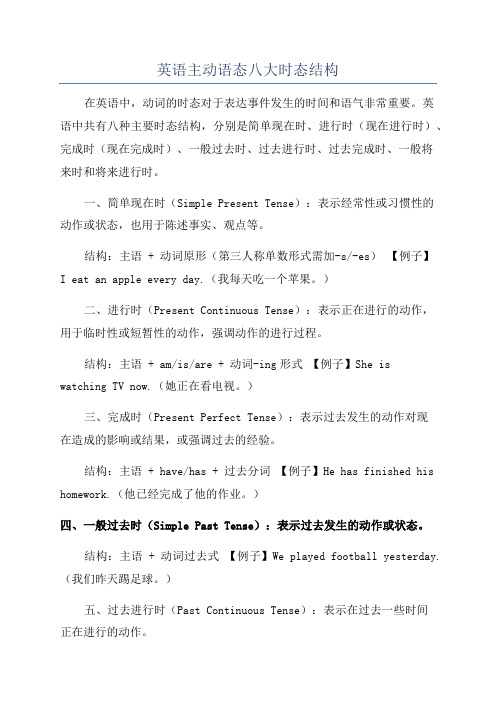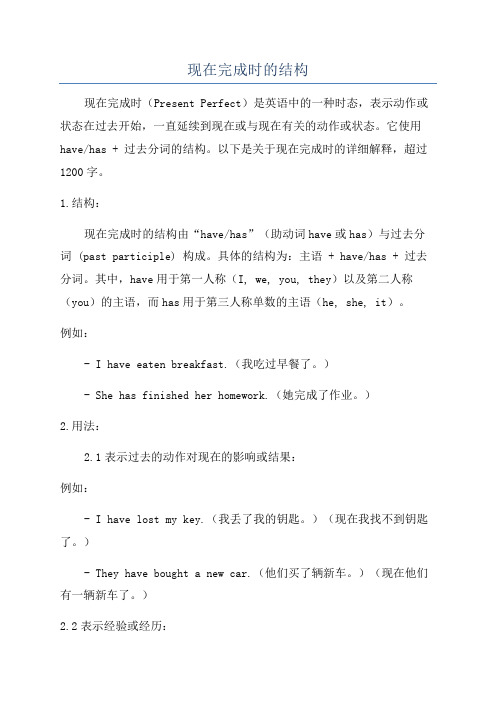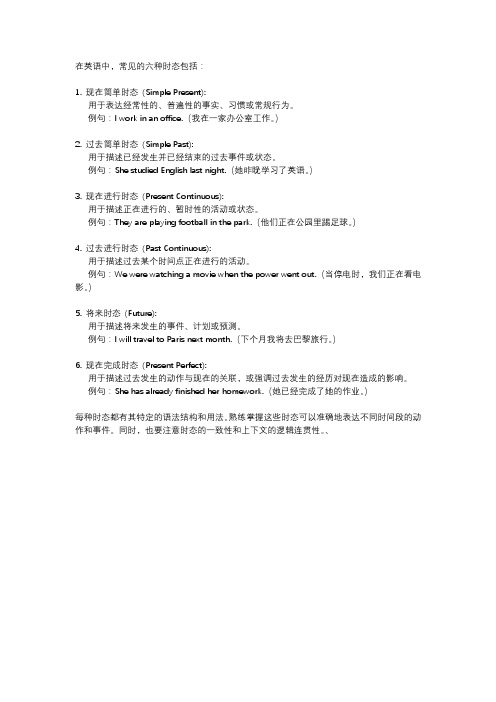简现在完成时
现在完成时的结构与用法

现在完成时的结构与用法小伙伴们!今天咱们来一起学习现在完成时的结构与用法呀。
这可没有大家想的那么难哦。
首先呢,现在完成时的结构,基本就是“have/has + 过去分词”。
就这么简单的一个小公式,不过,可别小瞧它呀。
很多人刚开始的时候,总是容易忘记这个结构,所以一定要记好哦。
我自己当初学的时候,也是反复念叨这个结构好多遍才牢牢记住的呢。
那啥是过去分词呢?一般来说,规则动词的过去分词就是在动词原形后面加 -ed。
比如说“work”,它的过去分词就是“worked”。
但是不规则动词就有点调皮啦,它们的过去分词可没这么规律,像“go”的过去分词是“gone”,“eat”的过去分词是“eaten”。
这时候咋办呢?最好是把那些常见的不规则动词的过去分词专门记在一个小本子上,没事儿就拿出来看看。
我就是这么干的,这办法还挺有效的呢。
接下来就是用法啦。
现在完成时常常用来表示过去发生的动作对现在造成的影响或者结果。
比如说“I have lost my key.(我把钥匙丢了)”,这里的“have lost”就是现在完成时,表示钥匙丢了这个动作发生在过去,但是现在的结果就是我没有钥匙了。
这一点真的很重要哦,真的!要好好理解这种表示影响或者结果的感觉。
另外呢,在句子里可能会有一些标志性的时间状语来提示我们要用现在完成时。
像“already(已经)”“yet(还,尚)”“just(刚刚)”“ever(曾经)”“never(从不)”这些词。
比如说“I have already finished my homework.(我已经完成我的家庭作业了)”。
看到这些词的时候,你就得反应过来,可能要用现在完成时喽。
不过呢,这也不是绝对的具体还得根据句子的语境来判断。
最后我想再强调一下这个结构和用法的重要性。
真的很重要啊!在实际运用英语的时候,现在完成时出现的频率还挺高的呢。
所以,大家要多多练习哦。
你觉得自己掌握得怎么样啦?有没有信心去做几道练习题检验一下呢?加油哦!希望大家都能把现在完成时这个知识点轻松拿下!。
英语主动语态八大时态结构

英语主动语态八大时态结构在英语中,动词的时态对于表达事件发生的时间和语气非常重要。
英语中共有八种主要时态结构,分别是简单现在时、进行时(现在进行时)、完成时(现在完成时)、一般过去时、过去进行时、过去完成时、一般将来时和将来进行时。
一、简单现在时(Simple Present Tense):表示经常性或习惯性的动作或状态,也用于陈述事实、观点等。
结构:主语 + 动词原形(第三人称单数形式需加-s/-es)【例子】I eat an apple every day.(我每天吃一个苹果。
)二、进行时(Present Continuous Tense):表示正在进行的动作,用于临时性或短暂性的动作,强调动作的进行过程。
结构:主语 + am/is/are + 动词-ing形式【例子】She is watching TV now.(她正在看电视。
)三、完成时(Present Perfect Tense):表示过去发生的动作对现在造成的影响或结果,或强调过去的经验。
结构:主语 + have/has + 过去分词【例子】He has finished his homework.(他已经完成了他的作业。
)四、一般过去时(Simple Past Tense):表示过去发生的动作或状态。
结构:主语 + 动词过去式【例子】We played football yesterday.(我们昨天踢足球。
)五、过去进行时(Past Continuous Tense):表示在过去一些时间正在进行的动作。
六、过去完成时(Past Perfect Tense):表示过去一些动作已经发生在另一个动作之前。
结构:主语 + had + 过去分词【例子】I had already eaten dinner when she arrived.(她到达时我已经吃过晚饭了。
七、一般将来时(Simple Future Tense):表示将来一些时间或将来经常性的动作。
现在完成时的结构

现在完成时的结构现在完成时(Present Perfect)是英语中的一种时态,表示动作或状态在过去开始,一直延续到现在或与现在有关的动作或状态。
它使用have/has + 过去分词的结构。
以下是关于现在完成时的详细解释,超过1200字。
1.结构:现在完成时的结构由“have/has”(助动词have或has)与过去分词 (past participle) 构成。
具体的结构为:主语 + have/has + 过去分词。
其中,have用于第一人称(I, we, you, they)以及第二人称(you)的主语,而has用于第三人称单数的主语(he, she, it)。
例如:- I have eaten breakfast.(我吃过早餐了。
)- She has finished her homework.(她完成了作业。
)2.用法:2.1表示过去的动作对现在的影响或结果:例如:- I have lost my key.(我丢了我的钥匙。
)(现在我找不到钥匙了。
)- They have bought a new car.(他们买了辆新车。
)(现在他们有一辆新车了。
)2.2表示经验或经历:例如:- I have been to Paris.(我去过巴黎。
)(经历过巴黎这座城市)- Have you ever tried sushi?(你吃过寿司吗?)(经历过吃寿司这个经历)2.3表示动作已经完成但时间不具体:例如:- He has written a book.(他写了一本书。
)(已经写完,但是具体的时间不重要)- Have you ever seen the movie?(你看过那部电影吗?)(看过了,但是记不得具体的时间)2.4表示持续到现在的动作或状态:例如:- I have known him for ten years.(我认识他已经有十年了。
)- She has been in London since last month.(她从上个月开始一直在伦敦。
现在完成时与过去完成时

现在完成时与过去完成时现在完成时和过去完成时都是英语中的时态形式,用于描述动作或事件发生的时间。
虽然两者都表示过去发生的动作或事件,但它们的用法和概念稍有不同。
下面将逐一介绍现在完成时和过去完成时的用法及特点。
一、现在完成时 (Present Perfect)现在完成时用于描述过去发生的动作或事件对现在造成的影响或结果。
它的基本结构是“have/has + 过去分词”。
以下是现在完成时的几个主要用法:1. 表示过去发生的动作对现在造成的影响或结果:常与表示经验、常态或持续性的副词或时间状语连用,例如:already(已经)、yet (还)、never(从不)、ever(曾经)、so far(到目前为止)、recently(最近)、up to now(到目前为止)等。
例如:- I have already finished my homework.(我已经完成作业了。
)- Have you ever been to Paris?(你曾经去过巴黎吗?)2. 表示动作或事件发生时间不明确的情况下,强调的是结果或经验:常与表示程度或数量的副词连用,例如:just(刚刚)、already(已经)、never(从不)、ever(曾经)、yet(还)等。
例如:- I have just seen the movie.(我刚刚看过那部电影。
)- He has never traveled abroad.(他从未出过国。
)3. 表示过去开始的动作或事件一直延续到现在:常与表示时间段的状语连用,例如:for(表示时间段)、since(表示时间点)、howlong(多久)等。
例如:- They have lived in this city for five years.(他们在这座城市已经住了五年了。
)- I have known her since 2010.(我认识她自2010年起。
)二、过去完成时 (Past Perfect)过去完成时用于描述过去的某个时间点或之前发生的动作或事件。
英语中常见的六种时态的用法

在英语中,常见的六种时态包括:1. 现在简单时态(Simple Present):用于表达经常性的、普遍性的事实、习惯或常规行为。
例句:I work in an office.(我在一家办公室工作。
)2. 过去简单时态(Simple Past):用于描述已经发生并已经结束的过去事件或状态。
例句:She studied English last night.(她昨晚学习了英语。
)3. 现在进行时态(Present Continuous):用于描述正在进行的、暂时性的活动或状态。
例句:They are playing football in the park.(他们正在公园里踢足球。
)4. 过去进行时态(Past Continuous):用于描述过去某个时间点正在进行的活动。
例句:We were watching a movie when the power went out.(当停电时,我们正在看电影。
)5. 将来时态(Future):用于描述将来发生的事件、计划或预测。
例句:I will travel to Paris next month.(下个月我将去巴黎旅行。
)6. 现在完成时态(Present Perfect):用于描述过去发生的动作与现在的关联,或强调过去发生的经历对现在造成的影响。
例句:She has already finished her homework.(她已经完成了她的作业。
)每种时态都有其特定的语法结构和用法。
熟练掌握这些时态可以准确地表达不同时间段的动作和事件。
同时,也要注意时态的一致性和上下文的逻辑连贯性。
、。
现在完成时例句50个简单

现在完成时例句50个简单1. I have finished my homework.2. They have eaten lunch.3. She has watched a movie.4. He has gone to the store.5. We have visited our relatives.6. The dog has chased the cat.7. He has written an email.8. The kids have played outside.9. She has driven a car.10. He has cleaned the kitchen.11. They have read a book.12. She has taken a shower.13. We have gone on a vacation.14. He has studied for the test.15. They have listened to music.16. She has cooked dinner.18. They have gone to the beach.19. She has met her friends.20. We have celebrated a birthday.21. He has fi某ed the car.22. The teacher has assigned homework.23. She has bought new shoes.24. He has watched the news.25. They have played a board game.26. She has taken a nap.27. We have gone hiking.28. He has played soccer.29. They have watched a sports game.30. She has gone to the gym.31. He has learned a new skill.32. They have attended a concert.33. She has painted a picture.34. He has finished a project.35. They have visited a museum.36. She has learned a new language.37. He has helped a friend.38. They have gone on a road trip.39. She has done her laundry.40. He has bought groceries.41. They have volunteered at a charity.42. She has gone to a party.43. He has made plans for the weekend.44. They have gone to a theme park.45. She has visited a zoo.46. He has gone to a job interview.47. They have attended a wedding.48. She has taken a dance class.49. He has learned to cook a new dish.50. They have watched a documentary.。
现在完成时的简介
1、现在完成时的简介。
一、概念:表示过去发生或已经完成的动作对现在造成的影响或结果,也可表示从过去一直延续到现在的动作或状态二、结构:(一)肯定句主语+have /has +过去分词+其它1)I've copied all the new words .我已经抄写了所有的生词。
(表示不要再抄了)2)She has lost her books .她丢失了她的书。
(表示到目前为止还没有找到)(如果用过去时:She lost her books . 则强调书是过去丢的这一动作,而不知现在有没有找到)3)We've just cleaned the classroom .我们刚好打扫了教室。
(表明现在教室是干净的)(二)否定句主语+have /has+not+过去分词+其它1)I haven't finished my homework yet.我还没有完成我的作业。
2)She hasn't travelled on a train .她没有坐火车旅行过。
3)We have never spoken to a foreigner.我们从来没有和外国人说过话。
注:有时not可以用never代替,表示“从来没有”的意思。
又如:4)I have never seen him before.以前我从来没有见过他。
(三)一般疑问句Have /Has +主语+过去分词+其它?回答: Yes, 主语 + have / has.(肯定)No, 主语+ haven’t / hasn’t.(否定)1)—Have you ever made dumplings ?你曾经做过饺子吗?—Yes ,I have .是的,我做过。
2)—Has she ever danced before ?她曾经跳过舞吗?—No,never.不,从来没有。
3)—Have they found the lost books yet ?他们已经找到了丢失的书吗?—Yes ,they have.是的,他们找到了。
八大时态的基本结构
八大时态的基本结构八大时态是指英语中的基本时态,包括简单现在时、一般过去时、一般将来时、现在进行时、过去进行时、现在完成时、过去完成时和将来完成时。
下面将对每个时态的基本结构进行详细说明。
1.简单现在时简单现在时主要用来描述经常发生的动作、事实、常规情况以及普遍真理。
它的基本结构为:主语 + 动词原形(第三人称单数需在动词末尾加-s/-es)+ 其他成分For example:- I play basketball every day.- He watches TV every night.- They speak English fluently.2.一般过去时一般过去时用来表示已经结束的动作或状态。
它的基本结构为:主语+动词过去式+其他成分For example:- I played basketball yesterday.- He watched a movie last night.- They spoke to their teacher this morning.3.一般将来时一般将来时用来表示将来发生的动作或情况。
它的基本结构为:主语 + will + 动词原形 + 其他成分For example:- I will play basketball tomorrow.- He will watch a movie later.- They will speak to their teacher next week.4.现在进行时现在进行时用来表示正在进行的动作。
它的基本结构为:主语 + am/is/are + 动词-ing形式 + 其他成分For example:- I am playing basketball right now.- He is watching a movie at the moment.- They are speaking to their teacher currently.5.过去进行时过去进行时用来表示在过去其中一时刻正在进行的动作。
英语八大时态总结表
英语八大时态总结表英语中一共有八种时态,分别是简单现在时、现在进行时、简单过去时、过去进行时、一般将来时、将来进行时、现在完成时、过去完成时。
下面我们将对每一种时态进行详细介绍。
1、简单现在时简单现在时表示现在正在进行的动作或状态,也可以表示经常性、习惯性的动作或状态。
结构:主语 + 动词原形 / 动词第三人称单数形式(he, she, it)+ 其他例如:1. I eat breakfast every morning. 我每天早上吃早饭。
2. She teaches at a school. 她在一所学校教书。
2、现在进行时现在进行时表示现在正在发生的动作或状态。
结构:主语 + be动词的现在分词(am, is, are)+ 动词-ing + 其他。
例如:1. He is studying for the exam. 他正在为考试而学习。
2. We are watching a movie right now. 我们现在正在看电影。
3、简单过去时简单过去时表示在过去某个时间发生的动作或状态。
结构:主语 + 动词的过去式 / 动词的第二人称单数形式(you)+ 其他。
例如:1. They went to the beach last summer. 他们去年夏天去了海滩。
2. She talked to her friend on the phone yesterday. 她昨天给她的朋友打电话聊天了。
4、过去进行时过去进行时表示过去某个时间正在进行的动作或状态。
结构:主语 + be动词的过去分词(was, were)+ 动词的现在分词(-ing)+ 其他例如:1. They were playing soccer when it started raining. 下雨的时候他们正在踢足球。
2. She was studying when her phone rang. 她在学习的时候接到了电话。
现在完成时的句子30个简单
以下是30 个简单的现在完成时的句子一、肯定句I have seen that movie before.(我以前看过那部电影。
)She has visited Paris twice.(她已经去过巴黎两次了。
)We have learned English for five years.(我们已经学英语五年了。
)He has finished his homework.(他已经完成了他的作业。
)They have bought a new car.(他们已经买了一辆新车。
)My parents have been to Beijing.(我的父母去过北京。
)The teacher has taught this class for a semester.(这位老师已经教这个班一个学期了。
)I have read three books this month.(我这个月已经读了三本书。
)She has played the piano since she was six.(她从六岁起就弹钢琴。
)We have lived in this city for ten years.(我们已经在这个城市住了十年。
)He has written many letters to his friends.(他已经给他的朋友们写了很多信。
)They have planted some trees in the garden.(他们已经在花园里种了一些树。
)My sister has graduated from college.(我姐姐已经大学毕业了。
)The company has developed a new product.(公司已经开发了一种新产品。
)I have eaten breakfast.(我已经吃了早餐。
)二、否定句I haven't seen that movie yet.(我还没看过那部电影。
- 1、下载文档前请自行甄别文档内容的完整性,平台不提供额外的编辑、内容补充、找答案等附加服务。
- 2、"仅部分预览"的文档,不可在线预览部分如存在完整性等问题,可反馈申请退款(可完整预览的文档不适用该条件!)。
- 3、如文档侵犯您的权益,请联系客服反馈,我们会尽快为您处理(人工客服工作时间:9:00-18:30)。
5. How long have you _____ the football team of the school?
A been on B been at C joined D played
6. How long have you ____ this book? A bought B borrowed C had D lent 7. –Excuse me, ____ you seen the film yet? --- Yes, I _____ it last night.
6.小明参军半年了。 Xiao Ming ________ the army half a year ago. joined Xiao Ming ______________________________ has been a soldier/has been in the Army has been a member of the Army ____________________________ for half a year. 7.我们上了8年学了。 We __________________ for eight years. have been students 8.下课10分钟了 has been over The class ____________ for ten minutes. 9.电影开始了一小时了 The film has been on for an hour. __________ 10.门打开半小时了 has been open The door ________________ for half an hour.
2.
A.have/has been to, B.have/has been in/at, C.have/has gone to A
1. 2. 3. 4. 5. 6.
I ___________ Beijing before. B I ____________ Beijing for two weeks. A I ____________ Beijing twice. Mike is not in the classroom. He _________ Beijing. C --Where is Marry? C She _____________ the library
瞬间动词不能和表示一段时间的时间状语连用,但是他 可以转换成相应的延续性动词. 1.直接用延续性动词
buy– have
borrow/lend—keep put on– wear 2.转换成be+名词
catch (get) a cold –have a cold
become—be receive--have
1. --Ann has gone to Shanghai.
---So _______her parents. have
2. – I have watched the game.
--When ____ you ________ it? did watch
A have watched B do watch C did watch D will watch
We have learned 1,000 English words since we came here _______________________(自从我们来这里).
It is ___________ten months since they moved to France. I have learned English for ten years.(划线提问) How long have you learned English? _____________________________________________
A have, see B have, have seen C have, seen D have, saw
8. He has never ridden a horse before,_____? A is he B isn’t C hasn’t D has he
选用正确时态填空:
liked 1.I ________ (like ) noodles in the past. have learned 2.I _______________ (learn) two thousand English words in the past three years. Have been 3. _____ you ever_____ (去) to Japan? have stopped 4. I _____ just _______ (停止) doing my homework. has written 5. He ____________ (写) his letter already. wrote 6. He ____________ (写) a letter yesterday. hasn’t seen 7. Ann___________ (没看) the film yet. have met 8. --I _____________ (遇见)him before. -- Where _____ you _____ (遇见) him? did meet
2.他感冒三天了.
caught He _______ a cold three days ago. He _______ a cold for three days. has had
ago has had He _________ a cold since three days _____.
3.自从上星期我就借了这本书。
动词构成:have/has + p.p.(过去分词)
现在完成时动词构成 have /has+p.p.(v 过去分词)
否定 助动词 haven’t hasn’t
Have you……? 疑问 Has he……?
1. 用法
1.现在完成时态表示过去发生的动作对现在造成的影响或 结果常与already(已经),just(刚刚),yet(还),ever (曾经),never(从不),so far(到目前为止),up till now(到目前为止),recently(近来),before(从前), in the past (last)…years等连用。如: I have already finished my homework. Have you finished your homework yet? He hasn’t had his lunch yet. I haven’t met her before. She has just cleaned the classroom. Have you ever been to Beijing? They have never been to China before. I haven’t heard from my parents recently. In the past few years , I have changed a lot.
How long ____________
现在 现在完成时是________ 时
Exercises:
for a year I have been a teacher ____________.(一年) since last week He has been at this school ____________ (自从上周以来)
一般过去时态和现在完成时态可以构成同义句
1.我们买这本书三年了.
have had We ________ the book for three years. have had since We __________ the book _______ three years ago bought We ______ the book three years ago.
2.某个动作从过去已经开始,一直持续到现在,还有可能持续到将来. 动作的持续性要通过一段时间来表示.常与“for+一段时间”或 “since+某一时刻(时间的起点)”连用,此时要求句中的动词是 延续性动词。
一段时间的表达方法有两种:
for: +一段时间 for a year, for two weeks, for three years since 过去的某一时刻, since nine o’clock, since last week 一段时间+ago since two days ago +点
join the army – be a soldier
join the Party –be a Party member
go to school– be a student
3转换成be+形容词或副词 die— be dead finish – be over begin— be on fall asleep – be asleep fall ill—be ill leave— be away close – be closed open----be open go there—be there come here—be here come back—be back lose — be lost 4.转换成 be+介词短语 go to/get to/reach/arrive at school– be in school join the army – be in the army/be a member of the Army be a soldier
3.区分短暂性动词与持续性动词.
I have bought this pen for two months. I have had this pen for two months.
How long have you _____ this pen. had
